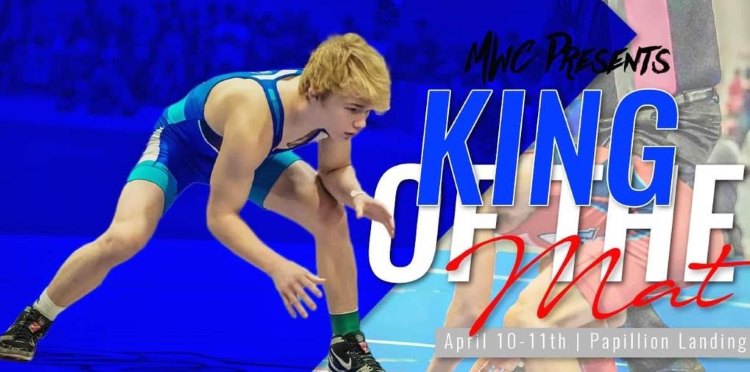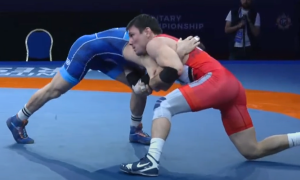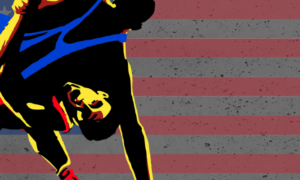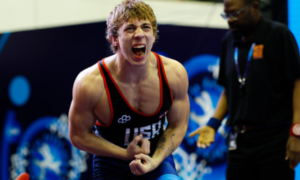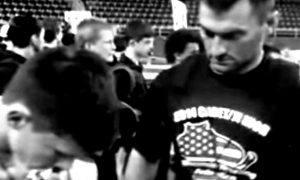All-Marine head coach Jason Loukides has witnessed a rise of positive activity for his wrestlers over the past few months. Two of his athletes — Ray Bunker (72 kg) and John Stefanowicz (82 kg) — appeared on the 2019 US World Team; his upper-weights are starting to turn the corner; and all of his guys who are on the National Team have already qualified for the Olympic Trials.
In fact, one more crowning recognition has also been bestowed upon Bunker and Stefanowicz recently, as both were named 2019 Male Athlete of the Year by the Marine Corps, a unique distinction for the two service members who just so happen to represent the classical style.

In the interest of condensing the narrative, Loukides is overseeing a booming era at Camp Lejeune, of which (whether he admits it or not) he is more than largely responsible. But as the Olympic Year starts to really heat up, there are new pressing concerns on the docket. This latest report presents Loukides appraising the performances of his group last week at the “Ranking Series” event in Italy, the ongoing preparation for the Trials, and of course, the upcoming Armed Forces Championships that always deliver when it comes to intensity.
5PM: What does it feel like for you to witness two of your guys get recognized by the entire Marine Corps as Athletes of the Year?
Coach Jason Loukides: Well, it’s really special because it’s not just Athlete of the Year. They also honor recruiters, drill sergeants… Basically the whole process a Marine goes through, they are honoring each step. And to include the physical fitness aspect and how that is shown through our sport in that ceremony with the Commandant is extremely special for us to be a part of. To see them up there in front of the Commandant or the Sergeant Major of the Marine Corps, it’s a room full of very high-level, important Marines and is just very special.
5PM: We’re a month removed from the Nationals now and the season is going to hit the fast-forward button with Armed Forces, the Last Chance Qualifier, and the Olympic Trials. Has the tone in the room changed now since there isn’t the luxury of time, and if so, how does that affect peaking and periodization concerns?
JL: Not really. We have a lot of guys who are in a little bit of a different situation. We have some guys who are going to the Pan Ams and some guys aren’t. For us, we had the Nationals and then the holidays, so we’re kind of gearing back up and focusing on trying to be ready for April. It’s kind of a build-back-up phase so we can be as sharp as we can be in April.
5PM: A handful of your guys (Jamel Johnson, Xavier Johnson, Bunker, Stefanowicz, and Daniel Miller) competed last week in Italy at the ranking tournament. It wasn’t the greatest tournament for the US program, so for an event like that where it is fly in and fly right out, what are you hoping for as the main takeaway? Especially considering the level these guys who competed in Rome are at?
JL: For me, I wanted my guys to be at the ranking tournament with the #1 guys at the Olympic weights and go through the same experience and get them used to thinking of themselves as #1s. And going through the same stress level of trying to earn points. You want to get them involved in that whole system so they will eventually shift into becoming the #1’s in those weights. Being around the environment where the goal for everyone is to earn points is good.
We didn’t really taper for the event. We knew it was going to be a struggle getting ready for it. Our guys were to wrestle through it, so I knew they wouldn’t be as sharp as they possibly could be. But it’s the experience of getting out there and competing in those types of events. Making yourself feel comfortable in that kind of environment is important for us.
5PM: Xavier Johnson’s weight class decision was a big topic of conversation among people. How did you direct your influence in that decision-making process? Did you have any preference whether he went 60 or 67?
JL: He’s right in the middle there, and there are some benefits for going down and some benefits to going up. We’re kind of hedging our bets to see which weight is qualified, or, which weight he’ll have the opportunity to qualify come April. Going to the Nationals and competing with the 67’s, he felt good there, and he doesn’t seem small for that weight. So, it becomes a preference on his end what he feels most comfortable with and we support him. Because, if you’re the best guy at 60 kilos, you’re going to be pretty good at 67; and if you’re the best guy at 67, you’re going to be pretty good at 60, if you can make the weights. It’s more about him and his development, and making sure he is having fun with it — because the guys who are winning are usually having a good time (laughs).
5PM: That’s an interesting part of this, does Xavier’s age play into this, as well? He’s young, his career is basically just getting started.
Coach Jason Loukides: A little bit. When he first started coming on the scene, you want him to basically be the biggest, fastest guy so that he can learn while also having a certain amount of success, so it pays to cut a little more weight in that environment. But as you develop and rely more on your techniques? I mean, his lift works just as good at 67 as it did at 60. He can lift 72 (kilogram athletes). It more becomes what he believes is best for him, and we support him in his decisions with that.
5PM: Vaughn Monreal-Berner, how has he been doing? He has just sort of blipped on the radar in recent events.
JL: Yeah, he has had a few dings here so he’s just getting 100% healthy. He always trains super-hard, he always wrestles hard. In his only match overseas (Haparanda Cup), he had to wrestle John (Stefanowicz) and then he doesn’t get to wrestle back. At the Nationals, he didn’t really wrestle badly. He had a nice match against Dan Olsen. He had some nice bodylocks in that match. But he made some mistakes and never got on a roll in that tournament. But he’s right where he needs to be. He just needs to be 100% healthy. He’s one of those guys who is going to give you everything he has whether he’s healthy or not. So, sometimes you should maybe rest him, but you don’t know because he never complains or says anything.
5PM: You see Monreal-Berner wrestle a couple of foreign matches this past year, and even if those matches aren’t wins, he’s got some good offense. Does he have to adjust against domestic guys if they are not opening up as much as the foreigners?
JL: He is good at scoring points, he is good in a lot of positions. He can do everything he needs to do, but he needs to become consistent to where he sticks with it when the score is really close or it’s a very hard battle. Guys who actually wrestle him? Then we can do bodylocks or arm spins, and it’s comfortable for him. Sometimes, he has to stay with a minute of fighting before he tries his moves, instead of trying them so soon. Sometimes that puts him behind in a match that is really competitive, and make it look like it’s not as competitive. But skill-wise, toughness, everything else, he’s ready. He just has to get it to where he is comfortable and in a groove, and stay in it for the full six minutes or however long he’s out there.
5PM: What’s the deal with (Terrence) Zaleski? We haven’t seen him crack open this Olympic Year yet.
JL: He’s just returning from injury. He’s training hard and getting back to where he needs to be. He’ll be ready in April, for sure. He’s where he needs to be. He’s healthy. He just has to get his conditioning and his timing back. It just takes a little time. But he has been recovering from an injury, that’s why he hasn’t been on the scene lately.
5PM: Is it different coaching or preparing your guys for an Armed Forces event during an Olympic season?
JL: It’s definitely different. It is more challenging with the events that are close to the Armed Forces and how prepare for them, but it’s also very important for us as it is for the other service branches. The real difference is that all year you plan for the tournaments and you can wrestle guys who are ready. But Armed Forces is dual meets, so you have to fill a lineup. If you don’t have as big of a team, then it becomes challenging to fill both Greco and freestyle, especially now that they are different weight classes. It’s a lot of effort that goes into preparing for Armed Forces so you can fill all the weight classes, have a strong lineup, and are ready to compete. Those are challenges you don’t deal with at any other time during the year.
5PM: As someone who has competed in the environment, and also as someone who coached on the collegiate level, can you describe the difference in intensity the Armed Forces dual meets have compared to something else the regular wrestling audience might relate to?
Coach Jason Loukides: I’d say it’s similar to an Ohio State/Michigan game, or any of the big rivalries people recognize. There is a lot of pride that’s on the line, and there is a lot you are representing. Whether you are trying to get a pin or a tech — or trying not to get pinned or tech’ed — every level in there carries a certain amount of pride that makes you fight that much harder. You are trying to represent so many people outside of yourself. It’s an outstanding event and it brings us together. We compete, and then there is the banquet afterwards with all of the services. But when you’re out there competing, it’s as important to the services as any other competitive rivalry out there. It is very intense, very stressful, and exciting at the same time.
Follow the All-Marine Wrestling Team on Facebook, Twitter, and Instagram for updates on results and competitive schedules.
Listen to “5PM33: The Marine Corps’ Jamel Johnson” on Spreaker.
SUBSCRIBE TO THE FIVE POINT MOVE PODCAST
iTunes | Stitcher | Spreaker | Google Play Music | RSS



